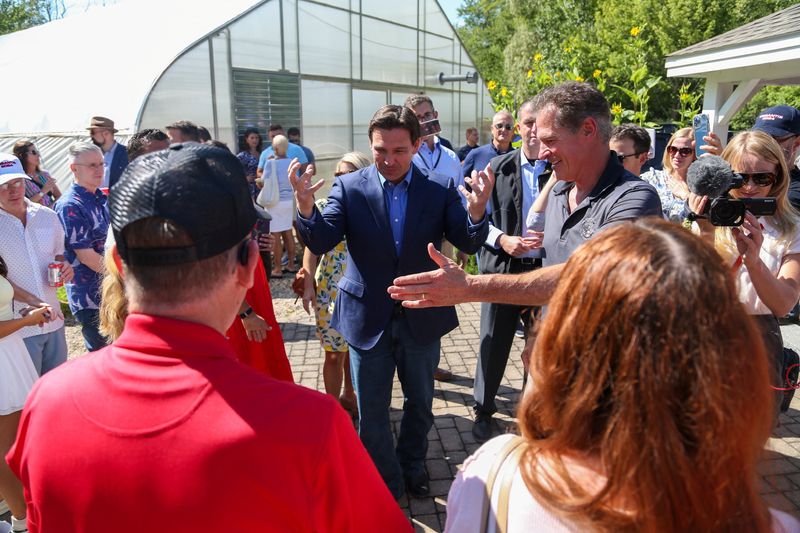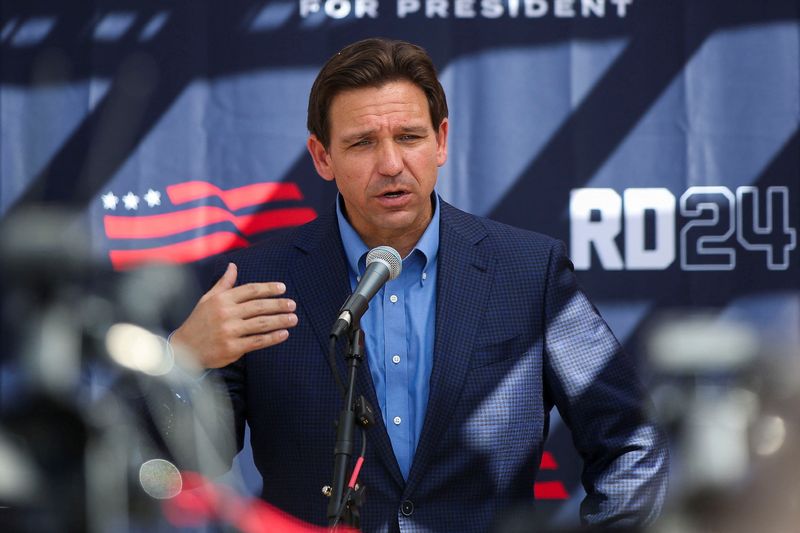By Gram Slattery
RYE, New Hampshire (Reuters) - Sunday afternoon for Ron DeSantis began at a restaurant. The Florida governor sidled into a booth to chat up a pair of newlyweds. Next he took questions at a barbecue outside a small red barn where onlookers munched on hot dogs.
His day of campaigning for the 2024 Republican presidential nomination ended at a lobster restaurant overlooking a marsh where onlookers snapped photos of him holding one of the excitable crustaceans in his hand.
Such was the first day of DeSantis' "reboot" of his campaign in New Hampshire, the No. 2 state in the Republican nominating contest calendar after Iowa. A win in either could provide momentum against front-runner and former president Donald Trump.
Having burned through cash faster than expected since declaring his candidacy in May and having failed to put a dent in Trump's roughly 30-point lead in Republican primary polls, DeSantis is now leaning into smaller-scale, more intimate events with voters, according to people close to the governor.
DeSantis made his name nationally by opposing many U.S. government policies to prevent the spread of COVID-19. He has since become a leading figure fighting what he argues are overly progressive polices favored by educators and corporations.
Now, he needs to give voters an opportunity to get to know him more intimately, although the new strategy has an inherent risk: DeSantis himself. Even his allies acknowledge he is not known for his natural affability.
The new strategy has the added benefit of being cheap, as the governor can hit multiple venues consecutively, with relatively little staffing and prep work, people close to the campaign say.
If the crowd at the "No B.S." barbecue at the home of former Republican Senator Scott Brown on Sunday was any indication, DeSantis could be in for a tough slog.
Wedged into a wooden pergola, DeSantis went through such talking points as immigration and energy, before taking at least a dozen questions from attendees standing on rocks and sitting in folding chairs.
Of the nine attendees Reuters interviewed, one had previously settled on supporting DeSantis. The others unanimously said they came away impressed, but they were keeping their options open.
These are the types of voters that DeSantis will be relying on if he is to boost his small-dollar contributions, which in turn is key for the health of his campaign. About two third of the $20 million DeSantis raised in the second quarter came from individuals who "maxed out" in campaign parlance, meaning they donated the maximum permitted amount to DeSantis and can contribute no more.
Before DeSantis began his speech, Michael Lunder, a 67-year-old businessman, said he was "probably going to support (DeSantis) financially."
After the speech, Lunder was more circumspect, saying he was impressed, but that he took issue with several of DeSantis' policies, including his opposition to offshore wind energy and criticism of electric vehicles.
"I learned a few things that I didn't agree with, but, in general, I think I might support him," Lunder concluded.
CAMPAIGN REBOOT
In the last two weeks, the DeSantis campaign has undergone a shake-up both in style and personnel, according to several people close to the campaign.
Having spent roughly $7.9 million in the first six weeks after its May 24 launch, the campaign is tightening its belt, making sure travel is more efficient by scheduling back-to-back campaign stops and spending less on events, they said.
On Tuesday, the campaign disclosed it had let go 38 employees in recent weeks, more than a third of the staff. Among other changes, the campaign replaced the chief financial officer and boosted the remit of that position, one person said, hoping to keep a lid on costs.
For the time being, the campaign will be trying to scoop up supporters, one diner stop and lobster restaurant at a time, a process that even the plan's proponents admit will be grueling.
Frank Cimler, an attorney in attendance at the "No B.S." barbecue, gave DeSantis high marks, saying he would be formidable on a debate stage against Democratic President Joe Biden, who will be seeking a second four-year term.
He disagreed with DeSantis' position that support for Ukraine in its war with Russia is not a vital U.S. national security interest. He also disagreed with the notion that the justice system has been "weaponized" against conservatives, an oft-repeated assertion of DeSantis and some of his opponents.

As he left, a volunteer asked Cimler if he would commit to supporting DeSantis.
Not yet, Cimler replied, but he would strongly consider it.
